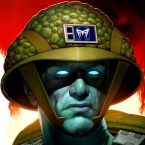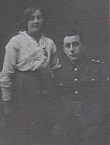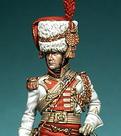zakblood
Posts: 22687
Joined: 10/4/2012
Status: offline

|
quote:
but is the real thing fun to play?
most groghead level of war games aren't fun to play for casual gamers at all imo, and new players are totally put off the war game type straight away, as when you says suits all levels of players in most modern games, you mean 30+ years of war game history, and a infinite level of time and patience and also understanding while patches are made and nearly all stuff is fixed, tweaked and changed, then re done again, so most of the time second game comes out before first one is sorted... patience is a virtue but also can be worn out over time.
quote:
game design best practices
historical accuracy, Abstraction, extremely complex and manuals as thick as the encyclopaedia Britannica imo isn't good game design or planning, as doesn't make good marketing sense either, as you narrow the field down to much as there's only so many this deep level players in any group of board by the % divided by the number of members in total.
quote:
Without dumbing down the games
this is where balance needs to be on a common ground with developers listening to testers even before beta, in early alpha stages and taking a cross section of gamers onto a development team for feedback early on, not late into a beta where it's mostly too late to change hard coded stuff anyway without a rewrite which won't happen because of time scales etc.
everyone wants war games on a war game forum,
to which level depends on the style and skill level of the player,
ground, air, sea then supply, with C&C being apart of the basic design.
for me games like the old spectrum classic Arnhem did it very well by CCS, supply was in the game, but wasn't the main game, same as air but not sea for this game.
so you spent you time sorting out supply first, then to move your troops, with airborne drops, infantry and tanks, plus onboard artillery, no abstracted rules about hidden anything or rules which only two scientists could understand, the level of command was layered, with distance being the main lack of not only c&c but also supply.
http://torinak.com/qaop#!arnhem
play it, then understand it, then copy it.
yes most like to have more of everything, greater supply and air options, ground options and transport issues, road network, trains and seaborne etc etc, but as you add the layers, so does the complexity also ramp up, old game had it in, but didn't swamp the player with it, and if you needed to get the AI to control something, you could, and it worked and worked well, new games make it so hard each turn you need to read and re read a manual or at least a chapter to fully understand what you are trying to do, and so most just stay away from that level of difficulty and look for something more (was going to say easier, but will only say more fun tbh)
so to rap it up, if it's too simple and basic it's only for beginners, if it's mid level then more will play it and try it, if it's hard core or even mentioned by a few as too hardcore, then only a smaller of the smallest group will even try, and then if some of them feel let down with other games in a series, that list grows smaller in time as well.
games need to be written better imo, so the AI can be over powerful and be able to control almost everything if needed for the beginner, then the learning curve also is sorted as well, as if the AI does most stuff for you but you have the ability to turn most of it off in the menu's at will and over time when you the buyer feels your ready for a greater challenge, the more will buy it and play it to start off with, as the game from the developer from day one is designed to be more user friendly for a larger target, not just aimed at a smaller % of them, so it's win win for everyone but would take longer maybe and be needed to be coded better from the off set to keep a larger number happy, easy to say but harder to do, and that's your challenge.
easy should be easy with maximum AI help turned on, and cater for new players only, medium level of difficulty should cater for the middle of the market, casual players with a bit more to do, with hard for grogheads only and next to no help if turned off from the AI, so the challenge for the player at that level is higher so all is kept happier.
< Message edited by zakblood -- 5/26/2015 4:17:17 PM >
|
 Printable Version
Printable Version

















 New Messages
New Messages No New Messages
No New Messages Hot Topic w/ New Messages
Hot Topic w/ New Messages Hot Topic w/o New Messages
Hot Topic w/o New Messages Locked w/ New Messages
Locked w/ New Messages Locked w/o New Messages
Locked w/o New Messages Post New Thread
Post New Thread